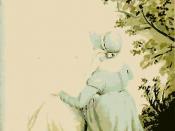In the transformation of Jane Austen's Novel Emma to Amy Heckerling's post-modern 'teen-flick' Clueless, the universal themes have been adapted to suit a wider modern audience. It is through studying the process of transformation that we can compare the characterisation and examine the composer's social commentary on their context. This leads not only to a greater appreciation of both texts but also demands a reassessment of values.
Emma depicts life in Highbury, a microcosm of nineteenth century England where social hierarchy, land, manners and marriage plays an important part in all aspects of life, especially the role of each person in society. Austen comments on what is important for a woman in the nineteenth century through Miss Bates, describing her as having, "a most uncommon degree of popularity for a woman neither young, handsome, rich, nor married." This shows a stark contrast to Emma, who enjoys excellent prospects as she is "handsome, clever, and rich with a comfortable home and happy disposition".
The novel is told from Emma's point of view, however, Austen uses wit and authorial intrusion to satirise Emma's misconceptions of herself. The readers discover that Emma's having "very little to distress or vex her", was a satirical comment and simply Emma's view of herself. The novel portrays the heroine's youthful impetuosity and misguided attempts to shape the lives of others through the voice of an omniscient narrator. The readers are enlightened on Emma's faults that she will need to overcome before developing into a truly ideal woman.
In the film Clueless, Austen's use of wit and authorial intrusion has been replaced by the visual impact delivered from cinematography techniques. Heckerling's appropriation of Emma reflects the paradigms of the modern society, but the new medium and context has made it more accessible to a modern audience. The film...



Great analysis
well done. the analysis of values was well carried out. however i thought it may have been a stronger essay if context was further discussed
0 out of 0 people found this comment useful.